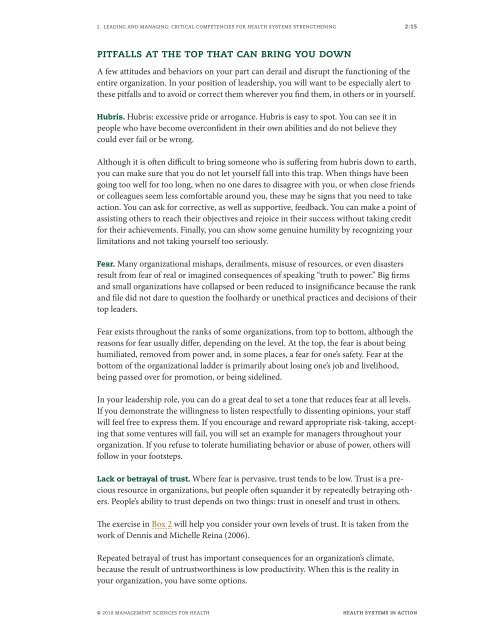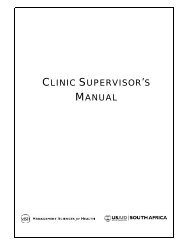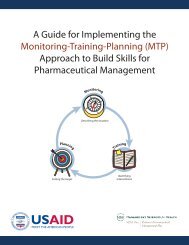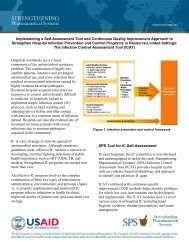- Page 1 and 2: Health Systems in Action an ehandbo
- Page 3 and 4: Health Systems in Action an ehandbo
- Page 5 and 6: contents List of Figures viii Healt
- Page 7 and 8: Glossary of human resource manageme
- Page 9 and 10: Figure 3. Typical Stock Card 7:27 F
- Page 11 and 12: The Health Extension Program, which
- Page 13 and 14: What People Are Saying about Health
- Page 15 and 16: We wrote this book for health care
- Page 17 and 18: acknowledgments Health Systems in A
- Page 19 and 20: Acronyms ACf allocable cost factor
- Page 21 and 22: CHAPteR 1 Achieving Results by Stre
- Page 23 and 24: 1. AChieViNG ReSULtS BY StReNGtheNi
- Page 25 and 26: 1. AChieViNG ReSULtS BY StReNGtheNi
- Page 27 and 28: 1. AChieViNG ReSULtS BY StReNGtheNi
- Page 29 and 30: 1. AChieViNG ReSULtS BY StReNGtheNi
- Page 31 and 32: 1. Achieving Results by stRengtheni
- Page 33 and 34: 2. LeADiNG AND MANAGiNG: CRitiCAL C
- Page 35 and 36: 2. LeADiNG AND MANAGiNG: CRitiCAL C
- Page 37 and 38: 2. LeADiNG AND MANAGiNG: CRitiCAL C
- Page 39 and 40: 2. LeADiNG AND MANAGiNG: CRitiCAL C
- Page 41 and 42: 2. LeADiNG AND MANAGiNG: CRitiCAL C
- Page 43 and 44: 2. LeADiNG AND MANAGiNG: CRitiCAL C
- Page 45: 2. LeADiNG AND MANAGiNG: CRitiCAL C
- Page 49 and 50: 2. LeADiNG AND MANAGiNG: CRitiCAL C
- Page 51 and 52: 2. LeADiNG AND MANAGiNG: CRitiCAL C
- Page 53 and 54: 2. LeADiNG AND MANAGiNG: CRitiCAL C
- Page 55 and 56: 2. LeADiNG AND MANAGiNG: CRitiCAL C
- Page 57 and 58: 2. LeADiNG AND MANAGiNG: CRitiCAL C
- Page 59 and 60: 2. LeADiNG AND MANAGiNG: CRitiCAL C
- Page 61 and 62: 2. LeADiNG AND MANAGiNG: CRitiCAL C
- Page 63 and 64: 3. PROMOtiNG GOOD GOVeRNANCe iN PUB
- Page 65 and 66: 3. PROMOtiNG GOOD GOVeRNANCe iN PUB
- Page 67 and 68: 3. PROMOtiNG GOOD GOVeRNANCe iN PUB
- Page 69 and 70: 3. PROMOtiNG GOOD GOVeRNANCe iN PUB
- Page 71 and 72: 3. PROMOtiNG GOOD GOVeRNANCe iN PUB
- Page 73 and 74: 3. PROMOtiNG GOOD GOVeRNANCe iN PUB
- Page 75 and 76: 3. PROMOtiNG GOOD GOVeRNANCe iN PUB
- Page 77 and 78: 3. PROMOtiNG GOOD GOVeRNANCe iN PUB
- Page 79 and 80: 3. PROMOtiNG GOOD GOVeRNANCe iN PUB
- Page 81 and 82: 3. PROMOtiNG GOOD GOVeRNANCe iN PUB
- Page 83 and 84: 3. PROMOtiNG GOOD GOVeRNANCe iN PUB
- Page 85 and 86: 3. PROMOtiNG GOOD GOVeRNANCe iN PUB
- Page 87 and 88: 3. PROMOtiNG GOOD GOVeRNANCe iN PUB
- Page 89 and 90: 3. PROMOtiNG GOOD GOVeRNANCe iN PUB
- Page 91 and 92: 3. PROMOtiNG GOOD GOVeRNANCe iN PUB
- Page 93 and 94: 3. PROMOtiNG GOOD GOVeRNANCe iN PUB
- Page 95 and 96: 3. PROMOtiNG GOOD GOVeRNANCe iN PUB
- Page 97 and 98:
3. PROMOtiNG GOOD GOVeRNANCe iN PUB
- Page 99 and 100:
3. PROMOtiNG GOOD GOVeRNANCe iN PUB
- Page 101 and 102:
3. PROMOtiNG GOOD GOVeRNANCe iN PUB
- Page 103 and 104:
3. PROMOtiNG GOOD GOVeRNANCe iN PUB
- Page 105 and 106:
3. PROMOtiNG GOOD GOVeRNANCe iN PUB
- Page 107 and 108:
4. PLANNiNG the WORK AND WORKiNG Wi
- Page 109 and 110:
4. PLANNiNG the WORK AND WORKiNG Wi
- Page 111 and 112:
4. PLANNiNG the WORK AND WORKiNG Wi
- Page 113 and 114:
4. PLANNiNG the WORK AND WORKiNG Wi
- Page 115 and 116:
4. PLANNiNG the WORK AND WORKiNG Wi
- Page 117 and 118:
4. PLANNiNG the WORK AND WORKiNG Wi
- Page 119 and 120:
Where are we going? 4. PLANNiNG the
- Page 121 and 122:
4. PLANNiNG the WORK AND WORKiNG Wi
- Page 123 and 124:
4. PLANNiNG the WORK AND WORKiNG Wi
- Page 125 and 126:
4. PLANNiNG the WORK AND WORKiNG Wi
- Page 127 and 128:
How will we get there? 4. PLANNiNG
- Page 129 and 130:
4. PLANNiNG the WORK AND WORKiNG Wi
- Page 131 and 132:
4. PLANNiNG the WORK AND WORKiNG Wi
- Page 133 and 134:
4. PLANNiNG the WORK AND WORKiNG Wi
- Page 135 and 136:
4. PLANNiNG the WORK AND WORKiNG Wi
- Page 137 and 138:
4. PLANNiNG the WORK AND WORKiNG Wi
- Page 139 and 140:
4. PLANNiNG the WORK AND WORKiNG Wi
- Page 141 and 142:
4. PLANNiNG the WORK AND WORKiNG Wi
- Page 143 and 144:
APPenDIX D. Activity Selection Deci
- Page 145 and 146:
5. MANAGiNG hUMAN ReSOURCeS 5:2 Int
- Page 147 and 148:
5. MANAGiNG hUMAN ReSOURCeS 5:4 tAB
- Page 149 and 150:
5. MANAGiNG hUMAN ReSOURCeS 5:6 tAB
- Page 151 and 152:
5. MANAGiNG hUMAN ReSOURCeS 5:8 An
- Page 153 and 154:
5. MANAGiNG hUMAN ReSOURCeS 5:10 3.
- Page 155 and 156:
5. MANAGiNG hUMAN ReSOURCeS 5:12 5.
- Page 157 and 158:
5. MANAGiNG hUMAN ReSOURCeS 5:14 Bo
- Page 159 and 160:
5. MANAGiNG hUMAN ReSOURCeS 5:16 Bo
- Page 161 and 162:
5. MANAGiNG hUMAN ReSOURCeS 5:18 (c
- Page 163 and 164:
5. MANAGiNG hUMAN ReSOURCeS 5:20 tA
- Page 165 and 166:
5. MANAGiNG hUMAN ReSOURCeS 5:22 Do
- Page 167 and 168:
5. Managing HuMan ResouRces 5:24 Ad
- Page 169 and 170:
5. MANAGiNG hUMAN ReSOURCeS 5:26 AP
- Page 171 and 172:
5. MANAGiNG hUMAN ReSOURCeS 5:28 St
- Page 173 and 174:
5. MANAGiNG hUMAN ReSOURCeS 5:30 th
- Page 175 and 176:
CHAPteR 6 Managing Finances and Rel
- Page 177 and 178:
6. MANAGiNG fiNANCeS AND ReLAteD SY
- Page 179 and 180:
6. MANAGiNG fiNANCeS AND ReLAteD SY
- Page 181 and 182:
6. MANAGiNG fiNANCeS AND ReLAteD SY
- Page 183 and 184:
6. MANAGiNG fiNANCeS AND ReLAteD SY
- Page 185 and 186:
6. MANAGiNG fiNANCeS AND ReLAteD SY
- Page 187 and 188:
6. MANAGiNG fiNANCeS AND ReLAteD SY
- Page 189 and 190:
6. MANAGiNG fiNANCeS AND ReLAteD SY
- Page 191 and 192:
6. MANAGiNG fiNANCeS AND ReLAteD SY
- Page 193 and 194:
6. MANAGiNG fiNANCeS AND ReLAteD SY
- Page 195 and 196:
6. MANAGiNG fiNANCeS AND ReLAteD SY
- Page 197 and 198:
6. MANAGiNG fiNANCeS AND ReLAteD SY
- Page 199 and 200:
6. MANAGiNG fiNANCeS AND ReLAteD SY
- Page 201 and 202:
6. MANAGiNG fiNANCeS AND ReLAteD SY
- Page 203 and 204:
6. MANAGiNG fiNANCeS AND ReLAteD SY
- Page 205 and 206:
6. MANAGiNG fiNANCeS AND ReLAteD SY
- Page 207 and 208:
6. MANAGiNG fiNANCeS AND ReLAteD SY
- Page 209 and 210:
6. MANAGiNG fiNANCeS AND ReLAteD SY
- Page 211 and 212:
6. MANAGiNG fiNANCeS AND ReLAteD SY
- Page 213 and 214:
6. MANAGiNG fiNANCeS AND ReLAteD SY
- Page 215 and 216:
6. MANAGiNG fiNANCeS AND ReLAteD SY
- Page 217 and 218:
6. MANAGiNG fiNANCeS AND ReLAteD SY
- Page 219 and 220:
6. MANAGiNG fiNANCeS AND ReLAteD SY
- Page 221 and 222:
6. MANAGiNG fiNANCeS AND ReLAteD SY
- Page 223 and 224:
6. MANAGiNG fiNANCeS AND ReLAteD SY
- Page 225 and 226:
6. MANAGiNG fiNANCeS AND ReLAteD SY
- Page 227 and 228:
6. MANAGiNG fiNANCeS AND ReLAteD SY
- Page 229 and 230:
6. MANAGiNG fiNANCeS AND ReLAteD SY
- Page 231 and 232:
6. MANAGiNG fiNANCeS AND ReLAteD SY
- Page 233 and 234:
6. MANAGiNG fiNANCeS AND ReLAteD SY
- Page 235 and 236:
6. MANAGiNG fiNANCeS AND ReLAteD SY
- Page 237 and 238:
6. MANAGiNG fiNANCeS AND ReLAteD SY
- Page 239 and 240:
6. MANAGiNG fiNANCeS AND ReLAteD SY
- Page 241 and 242:
6. MANAGiNG fiNANCeS AND ReLAteD SY
- Page 243 and 244:
6. MANAGiNG fiNANCeS AND ReLAteD SY
- Page 245 and 246:
6. MANAGiNG fiNANCeS AND ReLAteD SY
- Page 247 and 248:
6. MANAGiNG fiNANCeS AND ReLAteD SY
- Page 249 and 250:
6. MANAGiNG fiNANCeS AND ReLAteD SY
- Page 251 and 252:
6. MANAGiNG fiNANCeS AND ReLAteD SY
- Page 253 and 254:
6. MANAGiNG fiNANCeS AND ReLAteD SY
- Page 255 and 256:
6. MANAGiNG fiNANCeS AND ReLAteD SY
- Page 257 and 258:
7. MANAGiNG MeDiCiNeS AND heALth PR
- Page 259 and 260:
7. MANAGiNG MeDiCiNeS AND heALth PR
- Page 261 and 262:
7. MANAGiNG MeDiCiNeS AND heALth PR
- Page 263 and 264:
7. MANAGiNG MeDiCiNeS AND heALth PR
- Page 265 and 266:
7. MANAGiNG MeDiCiNeS AND heALth PR
- Page 267 and 268:
7. MANAGiNG MeDiCiNeS AND heALth PR
- Page 269 and 270:
7. MANAGiNG MeDiCiNeS AND heALth PR
- Page 271 and 272:
7. MANAGiNG MeDiCiNeS AND heALth PR
- Page 273 and 274:
7. MANAGiNG MeDiCiNeS AND heALth PR
- Page 275 and 276:
7. MANAGiNG MeDiCiNeS AND heALth PR
- Page 277 and 278:
7. MANAGiNG MeDiCiNeS AND heALth PR
- Page 279 and 280:
7. MANAGiNG MeDiCiNeS AND heALth PR
- Page 281 and 282:
7. MANAGiNG MeDiCiNeS AND heALth PR
- Page 283 and 284:
7. MANAGiNG MeDiCiNeS AND heALth PR
- Page 285 and 286:
7. MANAGiNG MeDiCiNeS AND heALth PR
- Page 287 and 288:
7. MANAGiNG MeDiCiNeS AND heALth PR
- Page 289 and 290:
7. MANAGiNG MeDiCiNeS AND heALth PR
- Page 291 and 292:
7. MANAGiNG MeDiCiNeS AND heALth PR
- Page 293 and 294:
7. MANAGiNG MeDiCiNeS AND heALth PR
- Page 295 and 296:
7. MANAGiNG MeDiCiNeS AND heALth PR
- Page 297 and 298:
7. MANAGiNG MeDiCiNeS AND heALth PR
- Page 299 and 300:
7. MANAGiNG MeDiCiNeS AND heALth PR
- Page 301 and 302:
7. MANAGiNG MeDiCiNeS AND heALth PR
- Page 303 and 304:
7. MANAGiNG MeDiCiNeS AND heALth PR
- Page 305 and 306:
7. MANAGiNG MeDiCiNeS AND heALth PR
- Page 307 and 308:
7. MANAGiNG MeDiCiNeS AND heALth PR
- Page 309 and 310:
7. MANAGiNG MeDiCiNeS AND heALth PR
- Page 311 and 312:
7. MANAGiNG MeDiCiNeS AND heALth PR
- Page 313 and 314:
7. MANAGiNG MeDiCiNeS AND heALth PR
- Page 315 and 316:
7. MANAGiNG MeDiCiNeS AND heALth PR
- Page 317 and 318:
7. MANAGiNG MeDiCiNeS AND heALth PR
- Page 319 and 320:
7. MANAGiNG MeDiCiNeS AND heALth PR
- Page 321 and 322:
7. MANAGiNG MeDiCiNeS AND heALth PR
- Page 323 and 324:
7. MANAGiNG MeDiCiNeS AND heALth PR
- Page 325 and 326:
7. MANAGiNG MeDiCiNeS AND heALth PR
- Page 327 and 328:
7. MANAGiNG MeDiCiNeS AND heALth PR
- Page 329 and 330:
7. MANAGiNG MeDiCiNeS AND heALth PR
- Page 331 and 332:
7. MANAGiNG MeDiCiNeS AND heALth PR
- Page 333 and 334:
CHAPteR 8 Managing Information: Mon
- Page 335 and 336:
8. MANAGiNG iNfORMAtiON: MONitORiNG
- Page 337 and 338:
8. MANAGiNG iNfORMAtiON: MONitORiNG
- Page 339 and 340:
8. MANAGiNG iNfORMAtiON: MONitORiNG
- Page 341 and 342:
8. MANAGiNG iNfORMAtiON: MONitORiNG
- Page 343 and 344:
8. MANAGiNG iNfORMAtiON: MONitORiNG
- Page 345 and 346:
8. MANAGiNG iNfORMAtiON: MONitORiNG
- Page 347 and 348:
8. MANAGiNG iNfORMAtiON: MONitORiNG
- Page 349 and 350:
8. MANAGiNG iNfORMAtiON: MONitORiNG
- Page 351 and 352:
8. MANAGiNG iNfORMAtiON: MONitORiNG
- Page 353 and 354:
8. MANAGiNG iNfORMAtiON: MONitORiNG
- Page 355 and 356:
8. MANAGiNG iNfORMAtiON: MONitORiNG
- Page 357 and 358:
8. MANAGiNG iNfORMAtiON: MONitORiNG
- Page 359 and 360:
8. MANAGiNG iNfORMAtiON: MONitORiNG
- Page 361 and 362:
8. MANAGiNG iNfORMAtiON: MONitORiNG
- Page 363 and 364:
8. MANAGiNG iNfORMAtiON: MONitORiNG
- Page 365 and 366:
8. MANAGiNG iNfORMAtiON: MONitORiNG
- Page 367 and 368:
8. MANAGiNG iNfORMAtiON: MONitORiNG
- Page 369 and 370:
8. MANAGiNG iNfORMAtiON: MONitORiNG
- Page 371 and 372:
8. MANAGiNG iNfORMAtiON: MONitORiNG
- Page 373 and 374:
8. MANAGiNG iNfORMAtiON: MONitORiNG
- Page 375 and 376:
8. MANAGiNG iNfORMAtiON: MONitORiNG
- Page 377 and 378:
8. MANAGiNG iNfORMAtiON: MONitORiNG
- Page 379 and 380:
8. MANAGiNG iNfORMAtiON: MONitORiNG
- Page 381 and 382:
9. MANAGiNG heALth SeRViCe DeLiVeRY
- Page 383 and 384:
9. MANAGiNG heALth SeRViCe DeLiVeRY
- Page 385 and 386:
9. MANAGiNG heALth SeRViCe DeLiVeRY
- Page 387 and 388:
9. MANAGiNG heALth SeRViCe DeLiVeRY
- Page 389 and 390:
9. MANAGiNG heALth SeRViCe DeLiVeRY
- Page 391 and 392:
9. MANAGiNG heALth SeRViCe DeLiVeRY
- Page 393 and 394:
9. MANAGiNG heALth SeRViCe DeLiVeRY
- Page 395 and 396:
9. MANAGiNG heALth SeRViCe DeLiVeRY
- Page 397 and 398:
9. MANAGiNG heALth SeRViCe DeLiVeRY
- Page 399 and 400:
9. MANAGiNG heALth SeRViCe DeLiVeRY
- Page 401 and 402:
9. MANAGiNG heALth SeRViCe DeLiVeRY
- Page 403 and 404:
9. MANAGiNG heALth SeRViCe DeLiVeRY
- Page 405 and 406:
9. MANAGiNG heALth SeRViCe DeLiVeRY
- Page 407 and 408:
9. MANAGiNG heALth SeRViCe DeLiVeRY
- Page 409 and 410:
9. MANAGiNG heALth SeRViCe DeLiVeRY
- Page 411 and 412:
9. MANAGiNG heALth SeRViCe DeLiVeRY
- Page 413 and 414:
9. MANAGiNG heALth SeRViCe DeLiVeRY
- Page 415 and 416:
9. MANAGiNG heALth SeRViCe DeLiVeRY
- Page 417 and 418:
9. MANAGiNG heALth SeRViCe DeLiVeRY
- Page 419 and 420:
9. Managing HealtH Service Delivery
- Page 421 and 422:
9. MANAGiNG heALth SeRViCe DeLiVeRY










